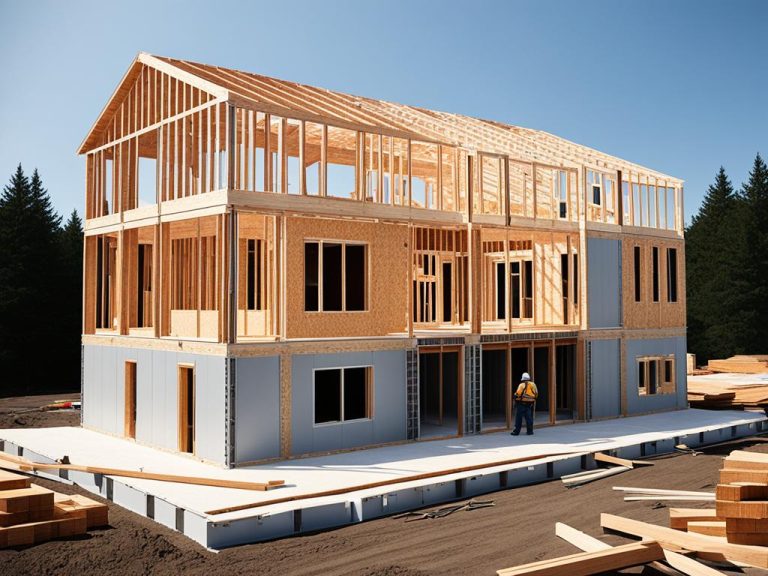Modular Home Electrical Wiring: Essentials Guide
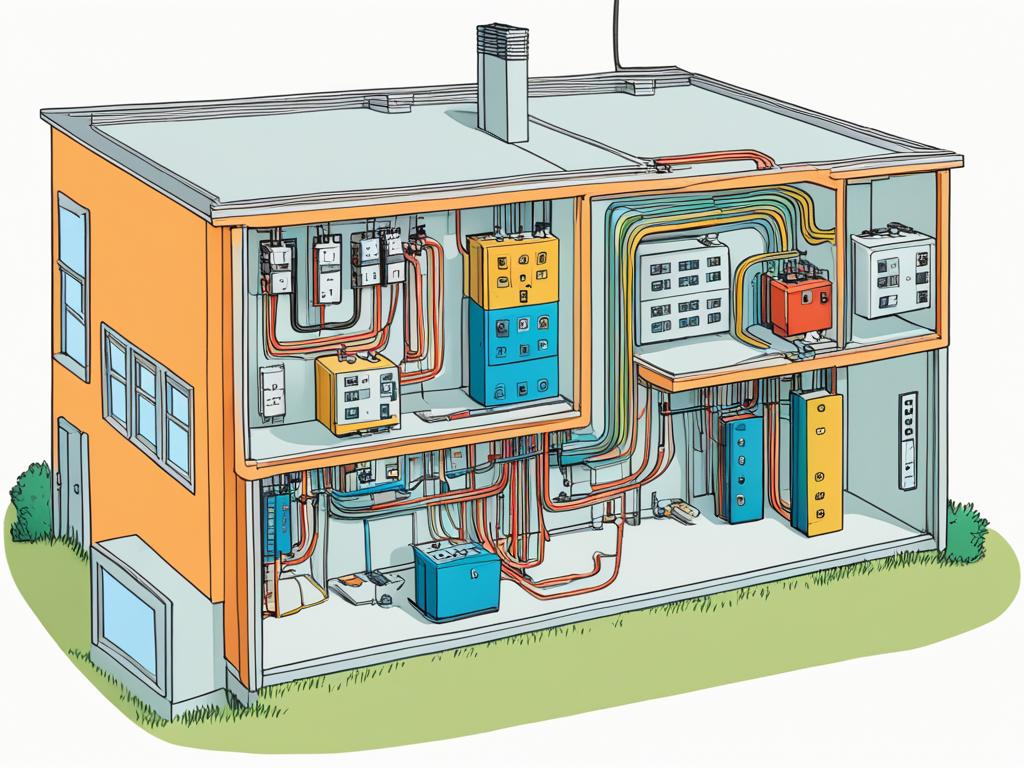
When it comes to the electrical wiring of modular homes, understanding the essentials is crucial. Whether you’re building a new modular home or considering a rewiring project, knowing the ins and outs of modular home electrical systems is essential for a safe and compliant installation. In this guide, we’ll explore the key aspects of modular home electrical wiring, from the wiring process to the components required and the advantages of modular wiring systems.
Key Takeaways
- Modular homes follow the National Electrical Code (NEC) and have similar wiring processes to traditional homes.
- Wiring is completed during the production of the modular home, starting at the roof and running through electrical boxes.
- Components such as outlets, switches, electrical boxes, and the main panel are essential for a functional electrical system.
- Choosing the right electrician is crucial for a successful modular home electrical installation.
- Modular wiring systems offer time and cost savings, increased productivity, and the ability to address future advancements.
How Modular Homes Are Wired
Wiring in a modular home is completed before the interior and exterior drywall is finished. The layout of the home determines the placement of outlets, switches, and electrical boxes.
The wiring process begins at the roof, with holes drilled for wire installation. Wires are then run through electrical boxes for outlets, lights, and switches. Nail plates are used to protect the wiring from punctures. The main panel is attached but installed on-site. Exterior lighting should be included in the electrical plans.
Attic and basement wiring is conducted on-site and must comply with local or state codes. Consult with an electrician for heavy appliance additions and ensure proper installation and functioning of the wiring.
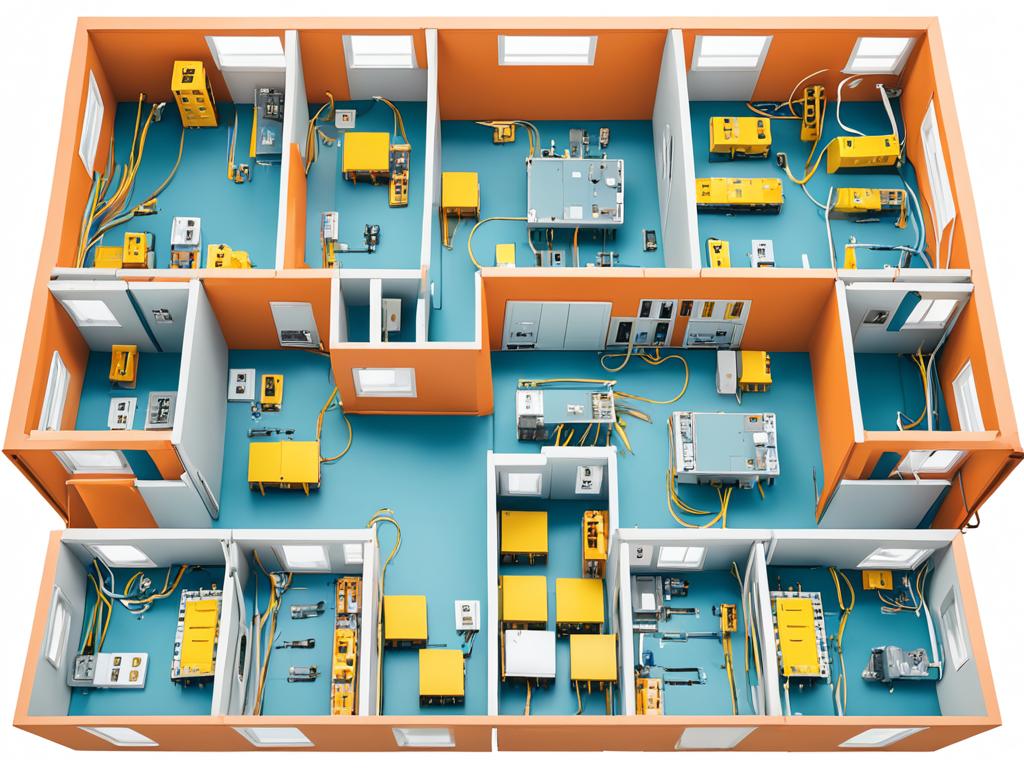
With the wiring completed early in the construction process, modular homes ensure a hassle-free installation. This allows for efficient and effective electrical systems within the finished home.
Wiring Components for Modular Homes
When wiring a modular home, several components are required to create a complete and functional electrical system. These components ensure that the electrical wiring in modular construction meets the necessary requirements and code standards.
Outlets play a crucial role in providing power to standard appliances in a modular home. Typically, outlets for standard appliances operate at 120 volts. However, for heavier appliances, such as air conditioners or electric dryers, 220- or 240-volt outlets may be necessary.
Electrical boxes come in various types and serve different purposes in a modular home. Some electrical boxes are designed to enclose wire splices, while others hold outlets and switches securely in place. These boxes provide protection and organization for the wiring system.
Switches are essential for powering individual rooms or controlling lights. They allow users to easily control the flow of electricity, making them a fundamental part of any modular home’s electrical system.
Non-metallic wiring is the most commonly used type of wiring in modular homes. It consists of insulated wire conductors and a ground conductor for added safety. This type of wiring ensures that the electrical system functions smoothly and adheres to safety standards.
The main panel, also known as the fuse box, is responsible for distributing current to different appliances, receptacles, and switches in the modular home. It acts as a central hub for the electrical system, enabling efficient and convenient access to electricity throughout the house.
It’s important to ensure that all these wiring components meet the electrical requirements and code standards specific to modular homes. Compliance with these standards guarantees a safe and reliable electrical system in the modular home.
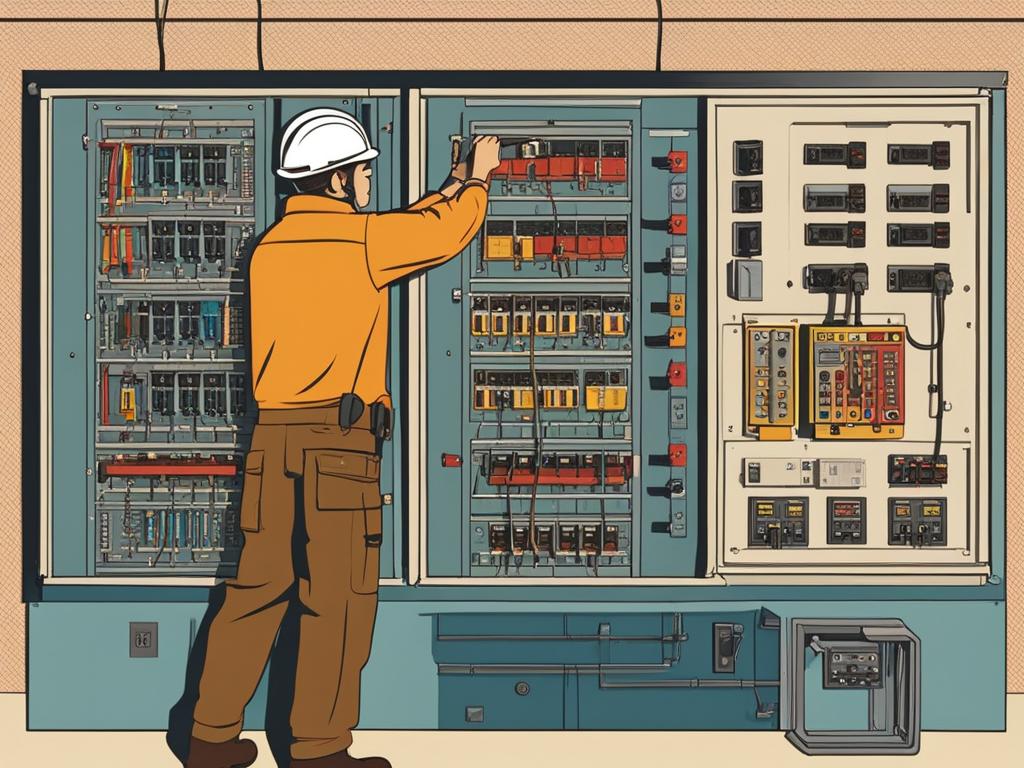
Continue reading to learn about choosing the right electrician for your modular home’s electrical installation.
Picking the Right Electrician for Your Modular Home
Choosing a qualified and experienced electrician is essential for a safe and compliant electrical installation in a modular home. When looking for an electrician, it’s always a good idea to seek recommendations from friends or family who have had experience with electricians for their modular homes. Personal recommendations can give you confidence in the electrician’s abilities and professionalism.
One of the first things to check when hiring an electrician for your modular home is their licensing and insurance. It’s important to ensure that the electrician holds a current license that covers modular homes and has liability insurance to protect you and your property in case of any unforeseen circumstances.
Experience is another crucial factor to consider. Look for an electrician who has specific experience in working with modular homes. Their knowledge of modular home electrical installation and familiarity with the unique aspects of modular homes can ensure a smooth and efficient process.
Accreditations and qualifications are indicators of an electrician’s professionalism and expertise. Check if they have any relevant certifications or qualifications that showcase their commitment to ongoing learning and staying up-to-date with the latest electrical standards and practices. This can give you peace of mind knowing that your modular home will be wired to the highest industry standards.
Communication and attitude are also important factors to consider. A good electrician should be responsive, open to answering your questions, and willing to provide updates on the progress of the electrical installation. Their attitude towards their work and commitment to customer satisfaction can greatly impact your overall experience.
When selecting an electrician for your modular home, it’s beneficial to choose someone who offers reliable electrical services specifically tailored to modular homes. This ensures that they are well-versed in the unique requirements and considerations of modular home electrical code. Additionally, it’s helpful to read reviews or ask for references to gauge the electrician’s track record and the satisfaction of their past customers.
In conclusion, selecting the right electrician is crucial for a successful modular home electrical installation. By considering factors such as licensing, experience, qualifications, communication, and customer satisfaction, you can ensure that your modular home is wired safely and according to the modular home electrical code standards.
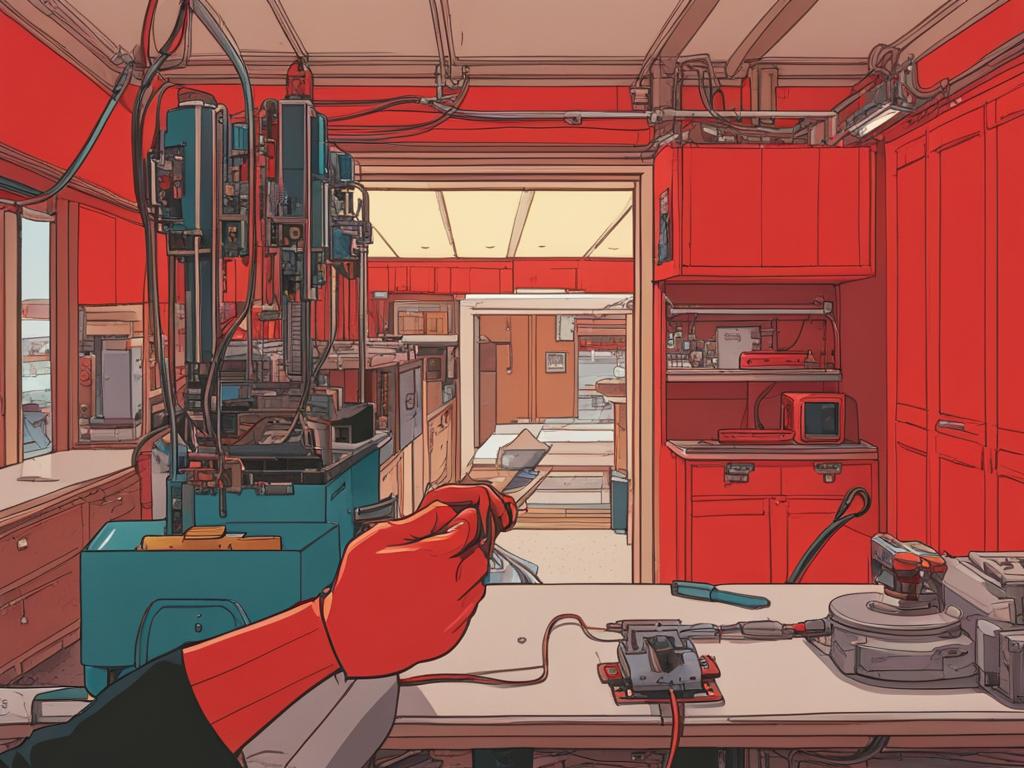
The Advantages of Modular Wiring Systems
Modular wiring systems offer numerous advantages over traditional hard-wired electrical installations in terms of time and cost savings. These systems are designed to be assembled off-site and provide efficient solutions for modular construction projects. By utilizing modular wiring systems, carbon emissions, energy consumption, and installation time can be reduced by up to 70%. This not only benefits the environment but also makes the entire construction process more efficient.
Modular wiring systems replace the need for traditional wiring methods by incorporating prefabricated connector and cable assemblies. These components simply connect together, allowing for a complete pluggable installation. This eliminates the need for complicated and time-consuming tasks such as wire cutting, stripping, and terminating, resulting in a streamlined and efficient electrical system.
One of the advantages of modular wiring systems is their proven track record in high-profile settings. For example, they have been successfully used in venues like the Olympic Stadium and St Bart’s Hospital. This demonstrates their reliability and suitability for large-scale projects.
In addition to the time and cost-saving benefits, modular wiring systems also address some of the challenges faced in the electrical industry. The modular approach helps to mitigate the skills shortage by reducing the skill requirements for installation. This means that less experienced electricians can effectively install these systems without compromising safety or functionality.
Another significant advantage of modular wiring systems is that they eliminate common issues such as snagging and fault finding. The pre-tested and pre-engineered nature of these systems ensures that they are ready for installation, minimizing the chances of errors or defects. This not only saves time but also reduces the need for costly rework.
Modular wiring systems adhere to consistent safety standards, making them a reliable and secure choice for electrical installations. By utilizing tried and tested components, these systems ensure that the electrical wiring is compliant with the modular home electrical code and construction regulations.
Overall, modular wiring systems represent the future of the electrical wiring sector. Their numerous advantages, including time and cost savings, increased productivity, and improved safety standards, make them a preferable choice for modular construction projects. By embracing modular wiring systems, builders and homeowners can benefit from an efficient, reliable, and compliant electrical system for their modular homes.

Key Points:
- Modular wiring systems offer time and cost savings compared to traditional wiring methods.
- They reduce carbon emissions, energy consumption, and installation time by up to 70%.
- Modular wiring systems feature prefabricated connector and cable assemblies for a pluggable installation.
- They have been successfully used in high-profile settings like the Olympic Stadium and St Bart’s Hospital.
- Modular wiring systems address the skills shortage in the electrical industry and increase productivity.
- They eliminate common issues such as snagging and fault finding.
- Modular wiring systems ensure consistent safety standards and compliance with the modular home electrical code.
Tips for a Successful Rewiring Job
Careful planning is crucial for a successful rewiring job in your modular home. To ensure a smooth and efficient process, follow these tips:
- Map out the position of lights, switches, and sockets in each room before starting the project. This will help you determine the most efficient wiring routes and ensure proper placement of electrical components.
- A rewiring job is completed in two stages. The first fix stage involves exposing the existing wiring and installing new wires where necessary. The second fix stage includes installing external electrical components such as outlets, switches, and light fixtures.
- When rewiring, consider future-proofing your electrical system by anticipating your potential requirements over the next 10 years. This could involve adding extra outlets, wiring for smart home technology, or accommodating any planned renovations.
- If you’re interested in integrating smart home features, such as automated lighting or a smart thermostat, a rewiring project provides an excellent opportunity to incorporate these technologies. Consult with an electrician to ensure proper installation and compatibility with your modular home’s electrical system.
- Upon completing the rewiring project, it’s important to obtain an official certificate confirming compliance with building regulations. This document not only provides peace of mind but also serves as proof of the work carried out.

Conclusion
Modular home electrical wiring follows the same standards and guidelines as traditional homes, adhering to the National Electrical Code (NEC). The wiring process begins during the production of the modular home, starting from the roof and extending through electrical boxes for outlets, lights, and switches.
Various components, including outlets, electrical boxes, switches, wires, and the main panel, are essential for a functional electrical system in a modular house. It is crucial to select the right electrician to ensure a successful installation of the electrical system in a modular home.
Modular wiring systems offer several advantages, such as time and cost savings, increased productivity, and the ability to accommodate future technological advancements. Proper planning and future-proofing are key considerations for a successful rewiring job in a modular home. By following these guidelines, homeowners can achieve a safe and compliant electrical system that meets their needs.
FAQ
What are the essentials of modular home electrical wiring?
Modular homes adhere to the National Electrical Code (NEC) and follow similar wiring processes as standard homes. The wiring is done during the production of the modular home, starting at the roof and running through the electrical boxes for outlets, lights, and switches. The wiring is protected with nail plates before the completion of the interior walls. The main panel is attached and installed on-site, and exterior lighting should be included in the electrical plans. Consult with an electrician for heavy appliance additions and ensure compliance with local or state codes for attic and basement wiring.
How are modular homes wired?
Wiring in a modular home is completed before the interior and exterior drywall is finished. The layout of the home determines the placement of outlets, switches, and electrical boxes. The wiring process begins at the roof, with holes drilled for wire installation. Wires are then run through electrical boxes for outlets, lights, and switches. Nail plates are used to protect the wiring from punctures. The main panel is attached but installed on-site. Exterior lighting should be included in the electrical plans. Attic and basement wiring is conducted on-site and must comply with local or state codes. Consult with an electrician for heavy appliance additions and ensure proper installation and functioning of the wiring.
What components are needed for modular home electrical wiring?
When wiring a modular home, various components are needed for a complete and functional electrical system. Outlets for standard appliances are typically 120 volts, while heavier appliances may require 220- or 240-volt outlets. Electrical boxes come in different types for different purposes, such as enclosing wire splices or holding outlets and switches. Switches are used to power rooms or control lights. The most common type of wiring used in modular homes is non-metallic, which includes insulated wire conductors and a ground conductor for safety. The main panel, also known as the fuse box, distributes current to appliances, receptacles, and switches. These components must meet the electrical requirements and code standards for modular homes.
How do I pick the right electrician for my modular home?
Choosing a qualified and experienced electrician is essential for a safe and compliant electrical installation in a modular home. It is recommended to seek recommendations from friends or family who have had experience with electricians for their modular homes. Ensure that the electrician is licensed and insured, with a current license that covers modular homes. Consider their experience, qualifications, and any accreditations they may have. Communication and attitude are also important factors to consider. Look for an electrician who offers reliable electrical services specifically for modular homes and has a good track record with satisfied customers.
What are the advantages of modular wiring systems?
Modular wiring systems offer a time-saving and cost-effective alternative to traditional hard-wired electrical installations. These systems are designed to be assembled off-site and feature energy-efficient solutions. They reduce carbon emissions, energy consumption, and installation time by up to 70%. Modular wiring systems replace traditional wiring with prefabricated connector and cable assemblies that simply connect together for a complete pluggable installation. They have been successfully used in high-profile settings like the Olympic Stadium and St Bart’s Hospital. The reliability of modular wiring systems increases productivity, addresses the skills shortage in the electrical industry, eliminates snagging and fault finding, and ensures consistent safety standards. These systems represent the future of the electrical wiring sector.
What are some tips for a successful rewiring job in a modular home?
Careful planning is crucial for a successful rewiring job. Map out the position of lights, switches, and sockets in each room before starting the project. A rewiring job is completed in two stages: the first fix stage, where the wiring is exposed, and the second fix stage, where external electrical components are installed. Future-proofing the electrical system by considering the homeowner’s potential requirements over the next 10 years is important. Smart home wiring can also be incorporated during a rewiring project, providing convenience and versatility for the homeowner. After completing the rewiring project, provide the homeowner with an official certificate confirming compliance with building regulations.

